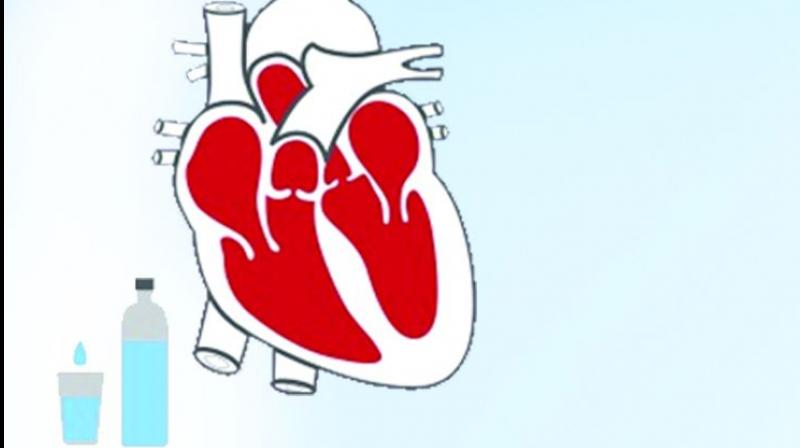Post-discharge care vital for heart failure patients
1 in 3 die within 1 yr of follow-up during productive yrs.

Hyderabad: Thirty-one per cent of patients in South India who suffered heart failure (which occurs when your heart muscle does not pump blood as it should) have succumbed within one year of diagnosis and 45 per cent died within the first three months after being discharged from hospital according to data tabulated by the Trivandrum Heart Failure Registry and published in the American Heart Journal.
The initial assessment and statistics have found that there is an urgent need to focus on post-discharge care and treatment protocol for heart failure patients.
Follow-up of 1,205 patients showed that one of three had died within one year of follow-up during their productive years of life.
The two main reasons for the fatalities was lack of adherence to treatment and improper post discharge care at home.
This was the main reason for re-hospitalisation too.
Dr M. Amaresh Rao, additional professor and cardiothoracic surgeon at Nizam’s Institute of Medical Sciences says two factors highlighted in the study need to be looked at closely. “Most heart failure patients have been coming to the hospitals regularly. Hence, there is an increased likelihood of readmission. Apart from that older age, lower education status, inability to understand the symptoms of the disease, history of stroke, higher serum creatinine levels and not following diet restrictions are some of the reasons why these patients show a poor survival rate. At the same time, the heart team needs to evaluate what and where is the lack of adherence to the treatment. Has the home caregiver understood the medical therapy and whether they need more counselling in terms of telemedicine follow-ups and specialised home care counselling. These factors are important and must be assessed at the medical level.”
The study has found that readmission was mostly in the first three months after discharge in the older group of patients. But in younger patients who came with heart failure, the mortality has been noted within a year.
President of the Cardiology Society of India Dr K. Sarat Chandra said, “The diagnosis in younger patients with aggravated symptoms and associated cardiac event require a different care. They need to control their salt consumption and diet. Often the post-hospitalisation care is not followed and that leads to death in younger patients.”
The burden of heart failure is being seen in both aging population and younger population with coronary heart disease, valve failure, infections, alcohol and drug abuse and genetic history of heart disease.
According to doctors, the younger patients who suffer from the condition follow up but they also indulge in a lot of doctor hopping and also opt for alternative treatments. These factors are becoming a bane in the treatment process as the adverse effects, interaction of drugs, and also food and drugs interaction lead to further failures in the body.
The heart is a mechanical organ whose job is to pump blood and once a failure sets in, the rectification process is to halt the failure with medication, therapy and surgery.
Experts state that the patient has to then decide which treatment to opt for. Some opt for medication and therapy and pull along, while others opt for surgery. With new drugs on trial, some also opt for clinical trials. Devices to help the functioning of the heart are chosen by some patients and they have shown a higher rate of survival than those who opt for surgery and medication. But due to the high cost of the device, which starts from Rs 2 lakh, takers are very few.
Patients are asked about their will to live and the quality of life that they want.
Those in their productive years are advised to avail of high-end treatment such as devices, and follow diet restrictions and lifestyle modifications to ensure a better quality of life.

